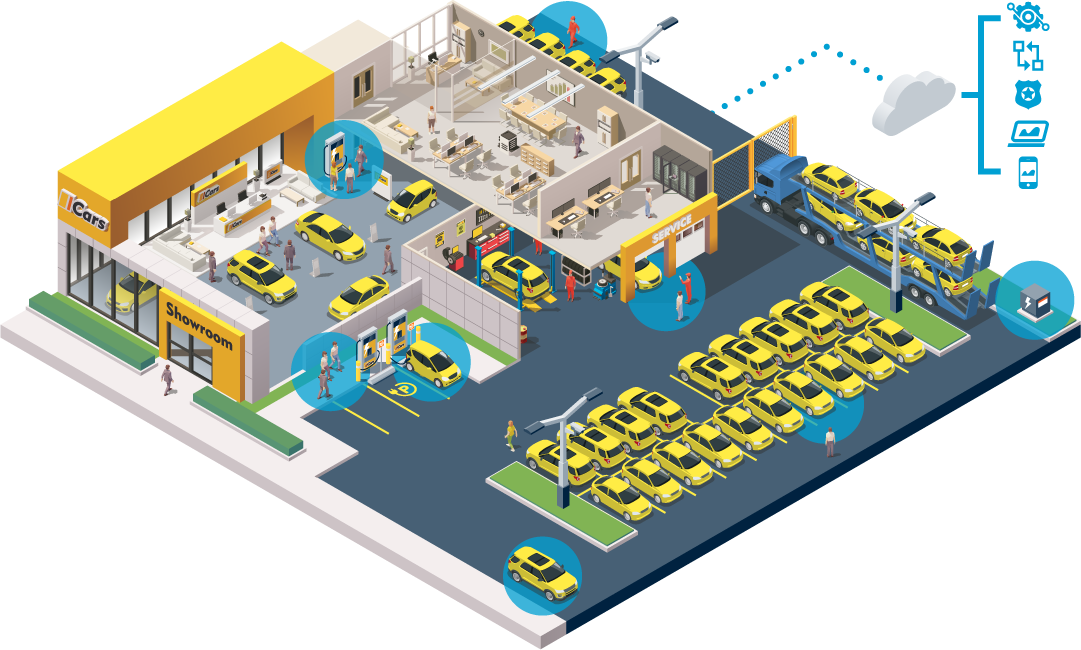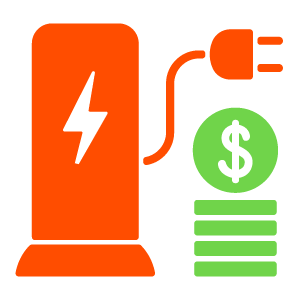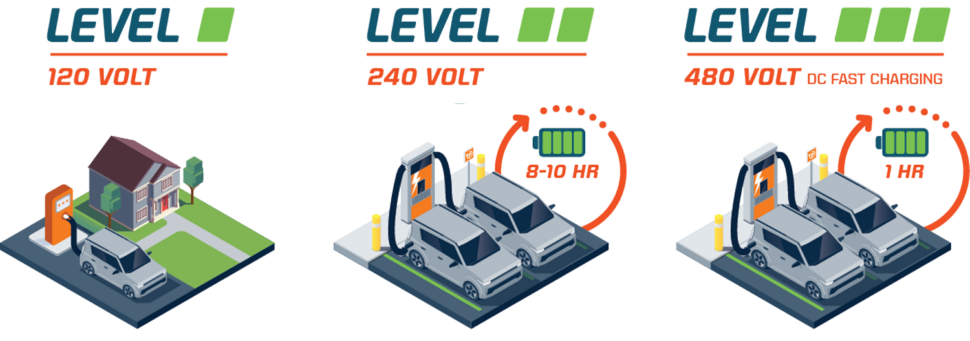How Much Do EV Chargers Cost?
There is no simple response to the question, “How much do EV chargers cost.” It’s a complex answer that involves a clear understanding of your business use case.
Since 2011, Future Energy has been working to help our clients incorporate emerging technology into their business strategy.
Many costs can be offset through financial incentives and government or utility programs. There are also many ways in which EV charging can benefit your business, such as helping a business increase revenue and positioning a company as an innovative leader in sustainability.

Hardware And Equipment Costs
An electric vehicle charger is a standing machine that resembles a miniature gas pump. A hose from the EV charging station terminates in a connector. The connector plugs into an EV’s charge port, much like a cell phone charger plugs into a mobile phone. Sometimes the connector from the EV station requires an adapter to fit the EV’s charge port.
There are three types of EV chargers, classified by the speed at which they charge. Level 1 chargers are appropriate only for residential use. They use 110-volt electricity, which is standard for a regular household outlet. This is the slowest EV charger, providing about five miles for each hour of charge. Level 2 and level 3 chargers are appropriate choices for commercial enterprises.

Level 2 EV Chargers
Level 2 chargers are currently the most common commercially available chargers, and many EV drivers also install them at home. A level 2 charger provides about 40 miles per hour of charge and can fill most EV batteries overnight.
Level 2 chargers run off 240-volt electricity. This type of outlet is what is used for heavy-duty appliances, such as clothes dryers. The process of converting the alternating current of the grid into direct current stored in the battery occurs inside the EV, not the charger itself.
As a result, level 2 charging is slower than that provided by level 3. Level 2 chargers cost substantially less than level 3 chargers at about $2,500 to $5,500 per unit.
Level 3 Fast Chargers
Unlike level 2 chargers, level 3 chargers run off direct current. For this reason, level 3 chargers are also known as direct-current fast chargers (DCFCs). Level 3 charging stations internally convert the alternating current from the power grid to direct current for the EV battery to store.
Because the equipment itself makes the conversion, level 3 chargers are the fastest—but also the most expensive—type of charger. Level 3 chargers have a wide range of power output. The fastest chargers can fill an EV’s battery in about a half hour.
The power output is one of many features that affect the cost of a level 3 charger, which can cost more than $100,000 per unit.
More details on the factors involved with the cost of an EV charger.
Overall Equipment Cost Considerations
The type of EVSE your business requires depends entirely on your business use case. For example, an auto dealership needs to charge its EV fleet overnight in the lot and has additional needs. These needs include charging electric vehicles that have come in for service or topping off the battery of a new EV for a customer.
These needs differ from those of a fleet of delivery trucks. Trucks traveling across the country will need to charge and get back on the road quickly.
For many companies, a combination of level 2 and level 3 chargers works best to fit the particular requirements. That’s why Future Energy works with our clients to determine the business objectives first. Then we strategize backward to determine the equipment that makes the most sense.
Related Soft Costs
The cost of the EV chargers is not the only consideration. Other items factor into the cost of optimizing the EV charging environment. While electric vehicles charge, their parking spaces require certain types of additional equipment for safety and to elevate a company’s branding.
For example, protective bollards positioned at the back of a parking spot cost around $400 each. Parking blocks or bump-stops, which also function to keep the vehicle in its allotted space, cost around $600 each. Additionally, custom striping and signage to promote a company’s brand may cost $1,500 or more.
Customers may elect to have Future Energy manage all of the soft costs associated with EV chargers. We work with our clients’ marketing teams to coordinate communication with printers, painters, and other relevant contractors.
Infrastructure Cost Factors
Every EV charging project requires proper site and infrastructure design. These steps are critical to ensure proper energy delivery and to optimize costs for your company’s future plans.
Upgrade Requirements
Level 3 EV chargers require access to 480-volt three-phase power. This is the most common power system used in industrial plants. Most businesses outside of the commercial industry don’t currently have access to 480-volt three-phase power.
Because utility companies provide 480-volt power only to industrial and commercial-grade applications, companies who choose to install fast chargers almost certainly will require an electrical upgrade. Future Energy estimates that upgrading the utility’s electrical conduits cost an average of $12,000 to $15,000.
Learn more about why Future Energy recommends upgrading your infrastructure now, regardless of your use case.

Infrastructure Hardware Costs
There is some cost associated with the hardware needed to support electrical upgrades. For example, EV charging solutions generally require higher-capacity conduits, panels, circuit breakers, and meters.
There is rarely a one-size-fits-all solution. Many businesses choose to work with an experienced partner to coordinate the needs of the company with what the utility can provide.
Find more information here about the cost of EV chargers and related hardware.
Infrastructure Upgrade Process
Requesting an infrastructure upgrade is a complex process that involves a long wait. Future Energy estimates it could take nearly two years for a company to get to the front of the line for an upgrade.
Future Energy has the expertise that helps our clients apply for necessary infrastructure upgrades and figure out how to offset costs. Our subject matter experts work with the more than 5,000 utility companies across North America on behalf of our clients.
Software And Networking Cost
As a practical matter, EV chargers must be able to connect to the internet, what is known as networked chargers. Networked EV chargers can talk wirelessly to each other and to management software.
At Future Energy we like to say, “Manage what you measure.”

Networking EV Chargers
Future Energy provides our clients with our proprietary Interface cloud software platform. Interface connects all of a company’s EV chargers with all of the other IT technologies on your premises or at subsidiaries. It’s a single source to view power use throughout an enterprise.
Smart technology systems could include lighting, video surveillance, elevator banks, heating and cooling, and additional systems. Interface provides a full picture of your company’s power usage.
Furthermore, the networking of EV chargers is a requirement to qualify for government and utility incentives that help offset overall costs of EV charger installation. Companies who wish to qualify for reduced utility rates must network their EV chargers so that they are visible to the utility.
Networked EV chargers have additional benefits in attracting customers. For instance, because networked chargers connect to the internet, they are visible to EV drivers via EV charging apps. This provides a potential revenue stream for companies who choose to implement public-facing chargers.
Managing Costs Using EV Charging Software
Without software to manage your EV chargers, your business could incur unexpected costs. You inadvertently could exceed peak energy consumption or charge your vehicles at a time when utility rates are at their highest.
A Future Energy analysis for a Florida dealership found that unmonitored electrical use of its planned EV charger installation could cost an extra $100,000 yearly. Interface controls costs by managing electricity use. Visibility into your power needs mitigates the increase in energy consumption caused by the addition of EV chargers.
For example, Interface can schedule EV charging for off-peak hours. It can send alerts when a business’s electrical systems are approaching peak consumption. It also uses operational data to generate reports that can help inform additional cost-saving measures.
Learn more about how Interface software manages power load shedding.
Using EV Charging Data for Greater Visibility Into Power Costs
You can access Interface from anywhere at any time on any device. One central dashboard provides data visualization and control for your smart devices. All of your EV charging data is available in real time so that you can stay on top of energy usage and cost.
To further reduce costs, Future Energy clients can automate EV station management using Interface. The software can automatically redistribute electrical load across EV stations or adjust other smart systems on the property. Other proactive measures help reduce energy costs proactively.
The entire platform is available to our clients in renewable three-year and five-year subscriptions. Plus, all Future Energy clients have access to our energy and operational support teams.
The use of EV charging data can further reduce cost reduction indirectly. Find more information about how EV charging data can help drive better business decision-making.
Consultants For EV Charging Cost Optimization
It’s easy to find a company that will sell you EV chargers and find you an electrician to install them. What sets Future Energy apart is our subject matter experts and end-to-end offerings. We start by answering your EV charging questions and we work as your partner to develop a strategy that works for your individual use case.

Road Map
Your EV charging needs and costs depend entirely upon your unique business use case. Before we even think about installing EV charging equipment, Future Energy conducts a detailed analysis of your particular needs.
Future Energy has conducted more than 500 EV impact studies for all kinds of businesses across North America. These customized analyses look at your EV charging needs through the lens of Future Energy’s seven solution pillars:
- Initiative
- Insight
- Infrastructure
- Integration
- Interface
- Instruct
- Inspect
These solution pillars typically work together to fuel your company’s overall strategy and determine cost. However, we also offer modular, customized solutions that fit the unique needs of your company.
Financial Incentives
Most businesses can offset the cost of EV charger installation through stacking financial incentives at the federal, state, and local levels. These incentives take the form of tax write-offs, direct grants and rebates, and favorable utility rates.
Future Energy works with our enterprise clients to navigate the complexities of applying for all available money. In many cases, a business can offset the cost of EV installation up to 100%. Our proprietary Financial Incentive National Database (FIND) tool reveals all available programs for our commercial clients.
Read more about Future Energy’s FIND the Money Tool, exclusively for our business clients.
Training
Future Energy provides one-time, complimentary training services for our clients. This training covers operation and management for equipment, our Interface software, and any other processes and tools your business needs following installation.
We help a dealership’s sales force answer customer questions surrounding the use of EVs and how to charge them.
No matter the business, our staff training ensures that your company understands how to operate and maintain the entire system.
Find additional information about the benefits of EV charging station consultants here.
Additional Answers About EV Charger Cost
Still have questions regarding how Future Energy can help your business understand how much EV chargers cost? Contact us today for a comprehensive consultation with our subject matter experts. Learn how EV charging can help meet the needs of your particular business
